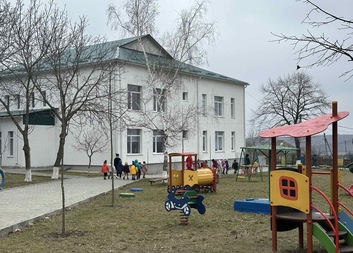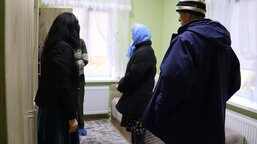Caritas Czech Republic has taken a step towards improving the sustainability and efficiency of water resource usage by introducing an innovative initiative to use rainwater as an alternative water source in Moldova. Throughout the year 2024, a rainwater capture, filtration, and storage system for household use will be constructed in the Albinuța kindergarten in the village of Bilicenii Vechi, Sîngerei district, with the involvement of Czech and national experts.
A model for improving water management
"This initiative is particularly welcome by public and social institutions because it allows us to collect, store, treat and then reuse rainwater for the institutions' needs. Our main goal is to use the resources we have in a way that does not abuse them, allowing future generations to benefit from them," says Cristian Cainarian, the president of the Sîngerei district.
At national level, there is a clear need to improve sanitation conditions in educational institutions, especially in rural areas. According to Ministry of Health from 2021, only 50% of Moldova's educational institutions had water infrastructure and 57% of schools had toilets outside the school building.
The kindergarten in Bilicenii Vechi is a representative example for several preschool educational institutions in rural areas of Moldova. According to experts, most of the water used for washing could be covered by collecting rainwater. This initiative aims to reduce water consumption for household purposes, having a significant impact on the institution's budget, which currently serves 125 children, with their numbers continually increasing.
"Most of the water consumption at the kindergarten is for household use in the bathroom, laundry, and kitchen. There is currently a water shortage, and we feel the problem of water scarcity in our institution. That’s why we try to use any opportunity to make savings in the kindergarten's budget," says Rodica Daraban, the director of the Albinuța kindergarten in Bilicenii Vechi.
Innovative concept for Moldova
The project involves Czech and national experts and the construction of this type of the system will be something new for Moldova, where similar systems do not currently exist. The expertise and experience brought by Caritas Czech Republic will contribute to the development an innovative water management model that will positively impact sustainability and efficiency in resource use.
This innovative project aims to provide a viable model for improving water and sanitation management in rural educational institutions by collecting and storing rainwater. It is an initiative with the potential for national expansion, contributing to the sustainable development of school communities. Caritas Czech Republic, through its involvement in this project, reaffirms its commitment to supporting affected communities and promoting innovative solutions to local problems.
"After finishing the construction of the system, a guide will be developed, presenting the technical model and the results obtained from using the system in the Bilicenii Vechi kindergarten. This guide will be presented to all interested mayors, encouraging them to adopt the same model," explains Vadim Strestian, project manager at Caritas Czech Republic in Moldova.
The project "Rainwater as alternative source of water in Moldova" is implemented by Caritas Czech Republic in partnership with the City Hall of Bilicenii Vechi Commune and funded by the United Nations Development Programme (UNDP).
Caritas Czech Republic supports sustainable initiatives in Moldova
Another initiative that will contribute to sustainability and efficiency in water resource usage is initiated by Caritas Czech Republic. For a period of 3 years, we will improve the sanitation conditions for students in 25 schools in Moldova, and will increase the awareness of hygiene for students, parents, school staff, local authorities, and the population in 25 communities.
Caritas Czech Republic has also been instrumental in bringing about sustainable changes in the social services system in Moldova. With our support, two Supported Housing facilities were opened in the cities of Glodeni and Soroca. These facilities have become homes for people with mental health problems who received support in community integration, development of communication skills, and finding employment opportunities.
We continue to focus our efforts on ensuring a sustainable impact on local communities by providing support in necessary sectors and delivering qualitative social services.










